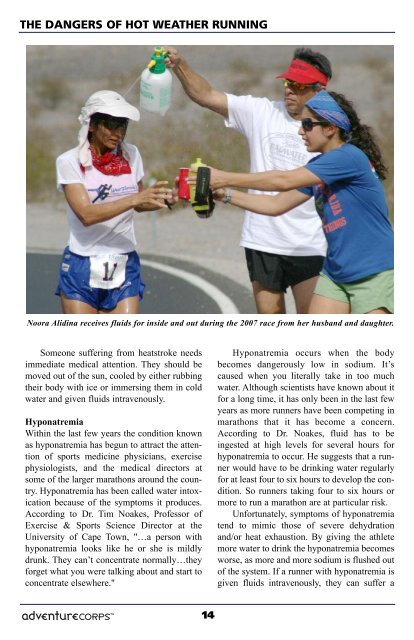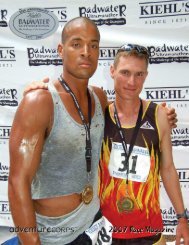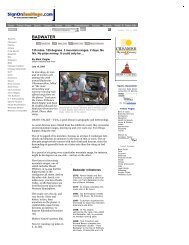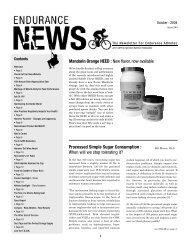Race Magazine - AdventureCORPS
Race Magazine - AdventureCORPS
Race Magazine - AdventureCORPS
Create successful ePaper yourself
Turn your PDF publications into a flip-book with our unique Google optimized e-Paper software.
THE DANGERS OF HOT WEATHER RUNNING<br />
Noora Alidina receives fluids for inside and out during the 2007 race from her husband and daughter.<br />
Someone suffering from heatstroke needs<br />
immediate medical attention. They should be<br />
moved out of the sun, cooled by either rubbing<br />
their body with ice or immersing them in cold<br />
water and given fluids intravenously.<br />
Hyponatremia<br />
Within the last few years the condition known<br />
as hyponatremia has begun to attract the attention<br />
of sports medicine physicians, exercise<br />
physiologists, and the medical directors at<br />
some of the larger marathons around the country.<br />
Hyponatremia has been called water intoxication<br />
because of the symptoms it produces.<br />
According to Dr. Tim Noakes, Professor of<br />
Exercise & Sports Science Director at the<br />
University of Cape Town, "…a person with<br />
hyponatremia looks like he or she is mildly<br />
drunk. They can’t concentrate normally…they<br />
forget what you were talking about and start to<br />
concentrate elsewhere."<br />
Hyponatremia occurs when the body<br />
becomes dangerously low in sodium. It’s<br />
caused when you literally take in too much<br />
water. Although scientists have known about it<br />
for a long time, it has only been in the last few<br />
years as more runners have been competing in<br />
marathons that it has become a concern.<br />
According to Dr. Noakes, fluid has to be<br />
ingested at high levels for several hours for<br />
hyponatremia to occur. He suggests that a runner<br />
would have to be drinking water regularly<br />
for at least four to six hours to develop the condition.<br />
So runners taking four to six hours or<br />
more to run a marathon are at particular risk.<br />
Unfortunately, symptoms of hyponatremia<br />
tend to mimic those of severe dehydration<br />
and/or heat exhaustion. By giving the athlete<br />
more water to drink the hyponatremia becomes<br />
worse, as more and more sodium is flushed out<br />
of the system. If a runner with hyponatremia is<br />
given fluids intravenously, they can suffer a<br />
14
















